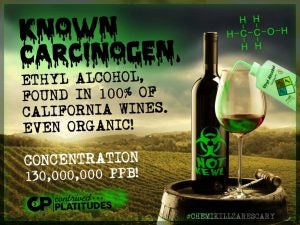“If you’re not drinking wine with organically grown grapes, you’re drinking pesticides — it’s nothing you want inside of you,” Cameron Diaz told InStyle. Diaz and her “clean” wine business partner, Katherine Power, realized that while they had switched to eating organic food and using clean skincare, they didn’t actually know what was inside the wine they had been drinking for half their lives. Cue the eyeroll and chemistry lesson.
Can we talk about “clean” wine for a second? Much like for food and beauty products, “clean” is a meaningless marketing term, but what’s even more ridiculous is that we’re talking about a Group 1 carcinogen, ethanol. That’s right, the most toxic substance in any glass of wine, whether it contains additives or parts per billion (ppb) levels of pesticide residues or not, is going to be the alcohol.
I’ve seen so many “clean” and organic wine companies popping up lately, and it just blows my mind that people actually believe that alcohol can be made healthier by being “clean” or “organic.” We already know that organic food is no safer or more nutritious than conventional food, and obviously ethanol produced from fermented organic grapes is going to be the exact same chemical compound as the ethanol produced from fermented conventional grapes. It’s all just EtOH, the same Group 1 carcinogen. To market it as “healthier” or “cleaner” is not only false, but extremely anti-science.
Organic winemakers often purport to not use pesticides, but in many cases they use organic-approved pesticides like copper sulfate as they deal with the same pest pressures as conventional grape growers, such as powdery and downy mildew, which is prevalent in any humid grape growing region. What you’ll notice is that they tend to specifically state that they don’t use “synthetic pesticides,” which may be true, but they are allowed to use any of the pesticides approved for organic farming, which have overlapping toxicities with those of synthetic pesticides. So, they aren’t necessarily less toxic to humans — or to the environment either. Even if ppb levels of pesticide residues are detected in wine, it’s ridiculous to fear them when you’re drinking millions of ppb of a Group 1 carcinogen.
Take the usual suspect, for example, glyphosate. An activist group tested various wines and beer for glyphosate residues last year and found a maximum level of 51 ppb of glyphosate. An adult would have to drink more than 140 glasses of wine or beer daily before the pesticide residues may cause a health issues. They also reported finding glyphosate in the organic beer brand too, interestingly enough. At any rate, it’s an extreme case of cognitive dissonance to be afraid of trace levels of pesticide residues when you’re literally consuming millions of ppb of a Group 1 carcinogen, the alcohol itself.

There are also additives approved for wine, which is the basis for another claim that these companies tend to make — that they don’t use any additives. That’s fine if they don’t. Why can’t they just leave it at that? Many of them go a few steps further down the fear-based marketing rabbit hole and claim that it somehow makes their products superior and healthier and “cleaner,” but again, we’re talking about alcohol. Not including approved additives isn’t going to make it any less toxic or healthier. One of Diaz’s selling points, that she always makes sure to mention, is the transparency of their label. Transparency is generally helpful for the consumer, especially when there could be ingredients added that are potential allergens. However, the only ingredient listed on their label is “organic grapes.” That’s not transparent at all considering they are actually using additives that they are choosing not to declare on the label, such as sulfites, bentonite clay, pea protein, cream of tartar, yeast, and yeast nutrients. So, it seems the claim of “transparency” is yet another disingenuous marketing ploy.
This isn’t to say that an occasional drink can’t be a part of an overall healthy diet. It can, but to market a known carcinogen as healthier or “cleaner” than an alternative product is absurd. The alcohol industry has done a great job of flying under the radar when it comes to consumer concerns about “toxins” and “carcinogens.” It seems like there are more concerns about ppb levels of pesticide residues on non-organic produce or “ingredients you can’t pronounce” than there are about consuming a substance that is a literal known carcinogen.
So, there you go, Cameron Diaz, that’s what’s in your “clean” wine — the same EtOH that’s in the wine you claim to be “pure pesticides.” Also, there’s probably ppb levels of pesticide residues in your wine too. Drink up and stop it with your elitist, anti-science nonsense.
Food Science Babe is the pseudonym of an agvocate and writer who focuses specifically on the science behind our food. She has a degree in chemical engineering and has worked in the food industry for more than decade, both in the conventional and in the natural/organic sectors.



